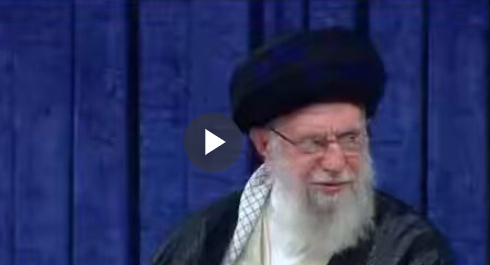The fake election in Iran has the desired outcome for the Mullahs
On Sunday, Iran’s supreme leader, Ayatollah Ali Khamenei, formally endorsed Masoud Pezeshkian as the new president. Pezeshkian, a reformist politician and heart surgeon, assumes leadership amid challenges posed by economic sanctions linked to Iran’s nuclear program.
#BREAKING: The moment when #Iran‘s leader of the Islamic Revolution gave the Presidential decree to the president-elect Masoud Pezeshkian enabling him officially as the 14th President of Iran pic.twitter.com/ErYkBHmFB7
— SNN (@snntv_en) July 28, 2024
During the endorsement ceremony, Khamenei advised Pezeshkian to focus on building relationships with neighboring countries, as well as African and Asian nations. He emphasized prioritizing countries that have historically supported Iran in its foreign policy endeavors.
Khamenei criticized European countries for imposing sanctions and an oil embargo on Iran, and for raising concerns about human rights issues. He also condemned Israel’s actions in Gaza, particularly the harm inflicted on civilians, including children and women. Khamenei accused Israel of committing war crimes and criticized the U.S. Congress for allowing Israeli Prime Minister Benjamin Netanyahu to speak before them.
In his address, Pezeshkian paid tribute to General Qassem Soleimani, who was killed in a U.S. drone strike in 2020. He vowed to pursue a “constructive and efficient” foreign policy, strengthen the rule of law, provide equal opportunities for citizens, support families, and protect the environment.
One of Pezeshkian’s first actions as president was appointing Mohammad Reza Aref as his first vice-president. Aref, a moderate reformist, previously held the same position under former President Mohammad Khatami. Aref is a Stanford University-educated engineer.
#Iran‘s Leader Ayatollah Ali Khamenei officially endorsed Masoud Pezeshkian as the country’s new president. The inauguration ceremony is also scheduled to take place on July 30 in the parliament. pic.twitter.com/Hg4nCLBiwi
— Iran Nuances (@IranNuances) July 28, 2024
Pezeshkian takes over from Ebrahim Raisi, whose untimely death in a helicopter crash led to the early election. He will be sworn in during a parliamentary session on Tuesday, after which he has two weeks to form a cabinet and seek a vote of confidence from parliament.
During his campaign, Pezeshkian promised not to make radical changes to Iran’s Shiite theocratic governance, affirming Khamenei’s role as the ultimate authority in state matters. He faces the complex task of navigating Iran’s foreign policy, balancing between potential confrontation and collaboration with Western nations, while contending with hard-liners in the government.
Pezeshkian has expressed both criticism and praise for the U.S. and Iran’s Revolutionary Guard, respectively. He notably commended the Guard for downing a U.S. drone in 2019, calling it a “strong message” to the U.S.
Among the significant challenges Pezeshkian faces is the ongoing conflict between Israel and Hamas in Gaza, as well as concerns over Iran’s uranium enrichment program. In April, Iran launched its first direct attack on Israel over the Gaza conflict. Tehran-aligned militia groups, including Hezbollah in Lebanon and the Houthi rebels in Yemen, have also increased their military activities.
#Iran‘s President Masoud Pezeshkian: “Ayatollah Khamenei has granted me this hefty responsibility by signing my presidential decree. I honor the memory of martyr Ayatollah Raisi and martyr Qasim Soleimani” pic.twitter.com/C1RVRquf9A
— SNN (@snntv_en) July 28, 2024
Despite indirect talks with the Biden administration regarding Iran’s nuclear program, there has been little progress in lifting the stringent economic sanctions that continue to affect Tehran.
Major Points:
- Iran’s supreme leader, Ayatollah Ali Khamenei, endorsed Masoud Pezeshkian as the new president, emphasizing a focus on relations with neighboring, African, and Asian nations.
- Khamenei criticized European countries for sanctions and an oil embargo, and condemned Israel for its actions in Gaza, calling them war crimes.
- Pezeshkian paid tribute to General Qassem Soleimani and promised a “constructive and efficient” foreign policy, along with supporting families and protecting the environment.
- Mohammad Reza Aref, a moderate reformist and former vice-president, was appointed as Pezeshkian’s first vice-president.
- Pezeshkian faces challenges including the Israel-Hamas conflict and Western concerns over Iran’s uranium enrichment, with no significant progress in lifting economic sanctions through indirect talks with the U.S.
RM Tomi – Reprinted with permission of Whatfinger News



